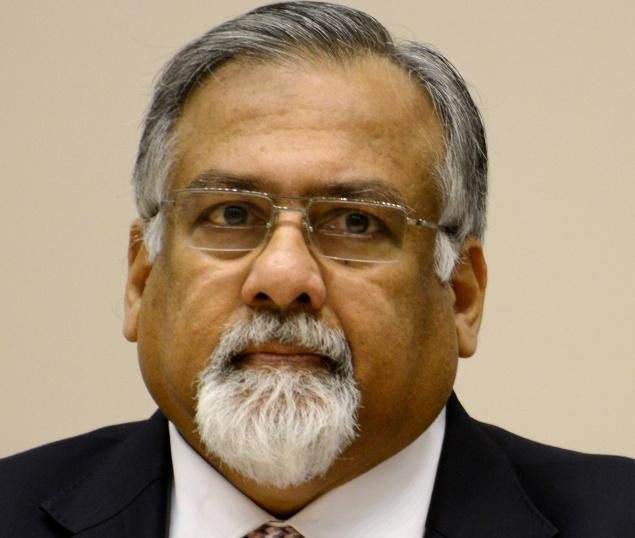Remembering GE Vahanvati, an advocate for LGBT rights in India


Goolamhussein Essaji Vahanvati, the 13th Attorney General of India, passed away on September 2, 2014, from a heart attack, at the age of 65. He served in office from June 2009 to May 2014, and was much in the news in the last years of the previous government, particularly for having to defend some dubious legal decisions. We remember him as a supporter of decriminalisation of homosexuality, both from before he became A-G and while he was serving.
In 2008, when he was solicitor-general, Vahanvati spoke before the UN Human Rights Council, trying to argue that India’s homophobia was a colonial relic [see ref, courtesy Aditya]. He stated, “Around the early 19th Century, you probably know that in England they frowned on homosexuality, and therefore there are historical reports that various people came to India to take advantage of its more liberal atmosphere with regard to different kinds of sexual conduct… [a]s a result, in 1860 when we got the Indian Penal Code, which was drafted by Lord Macaulay, they inserted Section 377 which brought in the concept of ‘sexual offences against the order of nature’.
In another piece he wrote in the Asian Age (hat tip to Nitin for posting it on the GB list long back) before he became A-G and while we were fighting the matter in the Delhi High Court, he stated “People have the right to lead their lives, privately, so long as they do not affect others… [I]n our country the right of persons to live their lives privately and on their own terms may take quite some time to achieve recognition. There are several sections in the Indian Penal Code which are anachronistic in a changed world. Section 377 is a prime example.”
The Union of India was against us at that time and it is significant that Vahanvati, who was a well known senior lawyer, was willing to take a public stand at that time.
When he became A-G I remember hearing speculation that he would not stick to his earlier stand when the matter came up in the Supreme Court. He was the first Muslim A-G and there were rumours he was under pressure from fundamentalist quarters not to support LGBT rights. And it did seem that was in the first chaotic days of the Supreme Court of India arguments when the government lawyer who had opposed us in the High Court got up to reiterate the arguments.
Almost immediately another government lawyer got up to say that he was wrong, but the damage was done and the judges were annoyed and demanded the A-G come to clarify matters. I remember we speculated he would not and just avoid the case, but to Vahanvati’s credit he came towards the end and fully supported us and said the law needed to change. Sadly, the judges didn’t listen to him.
Two days after the infamous 11-12-13 decision of SCI, Vahanvati wrote a strong piece in The Times of India titled “Law can’t remain static: Government told SC that Section 377 didn’t reflect Indian values”. Some excerpts:
” I belong to the school of thought which believes that an Attorney General must be heard in court and not outside it. However, there comes a time when an exception has to be made. I believe this is one such time. Given the importance of the matter and widespread anguish and heartache across the country, i feel that i must depart from this self-limitation to set the record straight and to explain the stand taken by the government in the Section 377 case.
“In my written submissions, therefore, I clearly and categorically stated: “Accordingly, it is submitted that the government of India does not find any legal error in the judgment of the high court and accepts the correctness of the same. This is also clear from the fact that it has not filed any appeal against the judgment of the high court.”
“The concept of intercourse against the order of nature is troublesome. It raised further questions: “What then is the order of nature?” and “What is against the order of nature?” Is it not conceivable that what was perceived to be against the order of nature in 1860 may not subsequently be perceived to be against the order of nature particularly in view of a change in society’s understanding or tolerance of that thing?
“The world has moved on. It is fast changing. Perceptions have changed. Attitudes have changed. Law does not and cannot remain static. Whenever necessary, the Supreme Court has reflected changed perceptions of the law and has struck outmoded laws down. They did so when striking down rent control laws as socially irrelevant. They also did it by breathing fresh life into Article 21, protecting life and personal liberty. They did it by consigning the archaic judgment in A K Gopalan vs State of Madras, rendered in 1950, into the dustbin of history. Unfortunately, they declined to give a similar treatment to Section 377. Therein lies the tragedy. ”
RIP Mr. Vahanvati, we will need more allies like you.
A tribute from lawyers Mayur Suresh and Arvind Narrain is here.

Great man, great words…yes, we indeed need more such amazing people on our side.